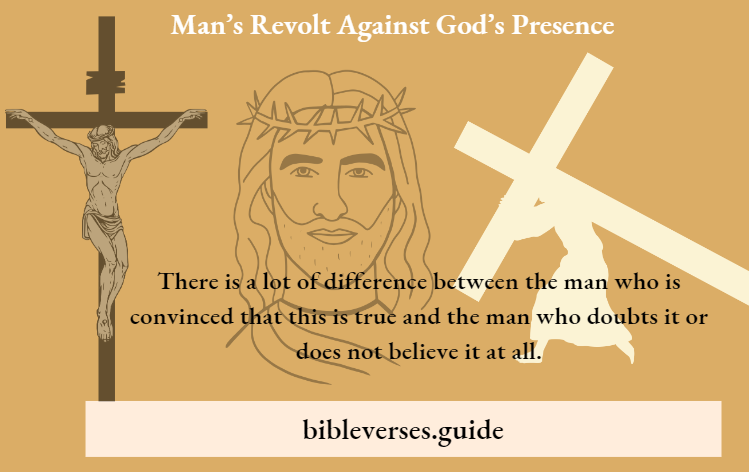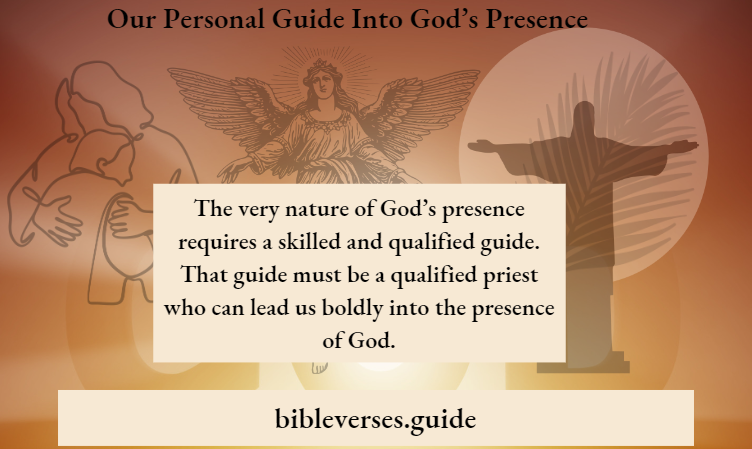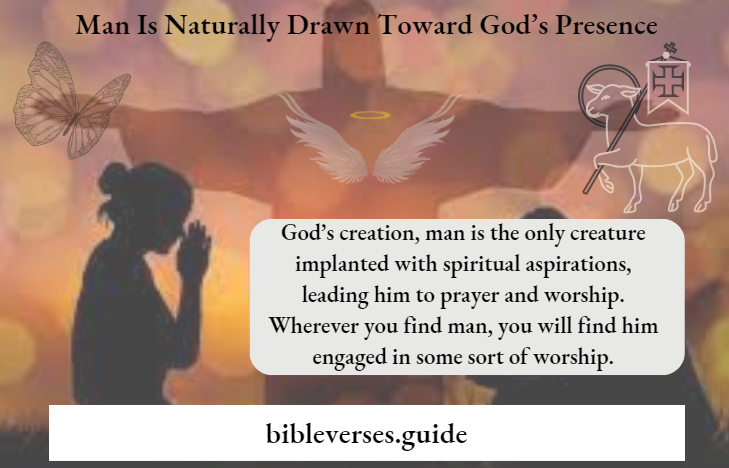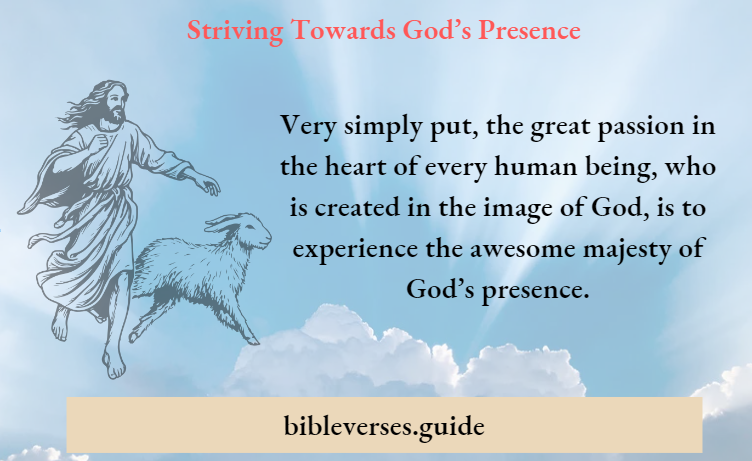The Nature Of God’s Presence Among Men
We have such a high priest… a minister of the sanctuary, and of the true tabernacle, which the Lord pitched, and not man.
Hebrews 8:1-2
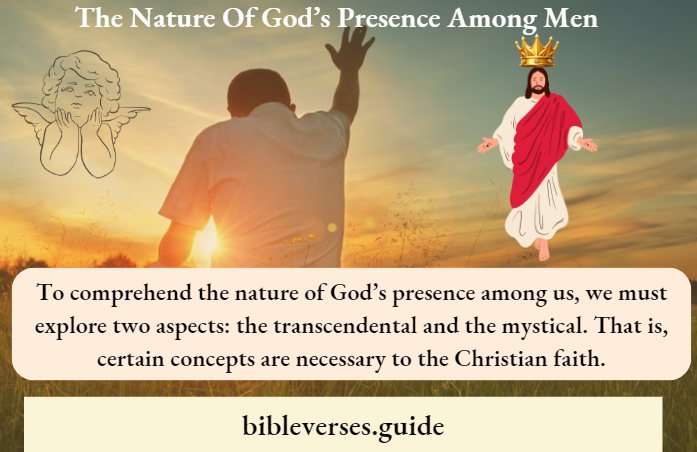
The Word of God interlocks so completely that if you destroy any one part of it, you destroy the rest.
That is why I have no place in my heart or my head for a liberal, because a liberal insists on believing what he wants to believe, even rejecting what does not suit him.
A Man Of Prayer Who Lives In God’s Presence Constantly
The result is that he has destroyed everything because each tiling depends upon everything else.
Read and Learn More Bible Verses about the Presence of God
God’s Transcendence
The very nature of God’s presence transcends human nature and is therefore beyond the grasp of mere human thought. When we come to the Scriptures, we must remember that through the Bible.
Bible Verses About Constant Communion With God
We are taught what sometimes has come to be called the “transcendental view of the world.” The word “transcendental” means a dozen things in philosophy.
Presence Of God Bible Verse
But what I mean by it is that somewhere there is an absolute. Somewhere there is that which is not relative; it is fixed and final and can have no beginning and no ending.
It transcends fate, time, space, matter, motion, law, and all these things, and we call that one, God. When Christians talk about Him, we call Him “our Father, which art in heaven.”
That is one of the great truths of the New Testament, which if removed, you have done to the Scripture what you do to a sweater when it unravels.
If you take a thread and just pull it along enough until you have pulled it out into one long thread, you have destroyed the sweater.
Characteristics Of A Man Of Prayer
Likewise, if you attempt to pull out this great, simple truth that God is God that He had no beginning, and that He created all things “that are in heaven.
And that are in earth, visible and invisible, whether they be thrones, or dominions, or principalities, or powers: all things were created by him, and for him” (Col. 1:16).
You unravel the sleeve of Christianity until you have nothing left but a memory. It is essential to accept this truth.
I know that many people do not accept it. Liberals deny it and materialists and certain scientists, but we do not care what people deny. Our job in life is not to deny, but to affirm.
And regardless of how it sounds to some, we affirm that there is another world above this world, of which this world is but the shadow; and in that world there is a throne, and on that throne, a God is ruling His universe.
The Mystical Element
Recognizing this transcendence is a mystical thing. By the word “mystical,” I mean nothing of the esoteric religion of the East. I mean that there is such a thing as a Christian knowing God and meeting God for himself.
That we can press our way into the sanctuary of the holy of holies, and with our hearts, we can meet, know, and feel.
Sense and experience God in a manner more wonderful than any man or woman can experience any human thing or any human being. This is what is taught here, and this is basic to Christianity.
To deny the presence and existence of a transcendental world of which God is the head and the creator and the Lord, and to deny the mystical element of Christianity.
Presence Of God Bible Verse
You might as well close your Bible and go for a walk because you will never understand it.
How To Live In God’S Presence Daily
If Christianity is reduced to a doctrine that can be explained with no intuitive knowledge, no direct knowledge of the heart of God, then where is the wonder of it?
I would not give a dime to support a teaching that denied the presence of God in His universe and the fact that the human heart can know God through Jesus Christ.
A Shadow Of Heaven
Earth is a shadow of heaven—sin excepted, of course. Heaven shines downward and throws its shadows; and those shadows we call the earth and the things therein.
Wherever sin is found, however, it is a shadow of hell and never can be of heaven. Sin is a disease, a deformity, a plague, a”blight, a treason, a rebellion, an error, a sacrilege, and a perversion.
It is all of those things and so it can be no part of heaven, for there is nothing of heaven in it and nothing in heaven like it.
Sin is a sinister presence in the universe, which God has permitted to be here for a little while. Its days are limited and numbered by the determinate counsel and foreknowledge of God.
When His good pleasure comes, He is going to destroy sin from the universe beat it, and chase it out of His universe until there is no sin left. So earth is the shadow of heaven.
Oneness Between Heaven And Earth
Genesis 1:1 tells us, “In the beginning, God created the heaven and the earth.” The universe is one Creator, one universe.
God made the universe, and He did not make it in everlasting contradiction to itself. He made it as one. He did not make several parts of the universe opposed to each other but working harmoniously together.
Christ, when He was on earth, taught the unity of heaven and earth and held that everything had its spiritual counterpart. For that reason, He was as much at home on earth as He had been in heaven.
There is a great deal of unnecessary mourning about our Lord coming down to the earth. A great many unnecessary and lugubrious tears are shed over our Lord’s incarnation.
Our Lord could become incarnated in the form of a man without embarrassment and difficulty because when God made man in the first place, He made Him in His image.
Presence Of God Bible Verse
It was a simple matter for the God who made the image to move into the image so that the incarnation of Christ is not a great difficulty to believe at all.
It is a mystery of godliness, but it is not hard to believe, though it is certainly impossible to understand. Christ could be incarnated in the form of a man, but not in the form of an angel.
No matter how high in the order of beings the angels may be, they were never said to be created in the image of God. Man is created in the image of God, and therefore, when God came down to be incarnated.
He fits into the nature of man as nearly as a man’s hand fits into a glove. And Jesus our Lord walked among men—among flowers and trees and babies and women.
And men and horses and all these things—just as naturally as He walked in heaven before He was incarnated, because heaven and earth, in the sight of God, are one.
The only thing that separates us for the moment is that sinister presence we call sin—just as a healthy man may be suddenly very ill.
A Man Of Prayer And Intimacy With God
All that prevents him from being a healthy man is the presence of certain microbes or bacteria or viruses in his veins. So in the universe, heaven and earth are one.
But what is present in the world now is that virus we call sin. And by the blood of Jesus Christ and die the power of His Spirit, when that is purged away from the world.
It will be seen that heaven can shine down on the earth because God made both. Jesus walked among men and talked about the birds and showed how the very birds could preach a sermon that we all ought to listen to.
He talked about the flowers and pointed to the lily that grew around there, and said, “That lily can teach you a lesson, for that lily grows in its beauty and there isn’t a man in all Palestine.
Not even Solomon when he was arrayed in all of his splendor, could be as good-looking as this flower. God made this flower and the flower had nothing to do with it.
Therefore, we give God the glory, and you stop worrying about yourself. Because God made the flowers, the Lord will take care of you.”
And the wind, the water, the light, life, growth, reward, punishment, and all these things He talked about on earth, showing that they were projections downward of Law that was as old as God and had their origin at the throne of God.
I pray and hope that Christians might get away from the notion that earth is under a shadow far away in some deep, subterranean cave of God’s universe.
And somewhere far away, shining in celestial splendor, there is a city, but there is no connection between the two. The devil would like us to believe that, but I do not believe it for a minute.
Presence Of God Bible Verse
I believe that the Christian whose heart is alive, alert, and sensitive to the light of God can see the city that “hath foundations, whose builder and maker is God.”
Moreover, he does not have to go to heaven to see it. I do not mean he sees visions in the night, wakes his wife, and says, “I just saw a vision.”
I have never gone much for that kind of thing. I never had a vision in my life. I never had a dream I could not explain by something I ate or something I had seen or did not do.
I am trying to say that the Christian, who is inwardly alive and has the life of God in him, will find himself at home among men and at home in heaven because he belongs in both, just as Jesus did.
When Jesus Christ walked on the earth, He was in the bosom of the Father, and there was no contradiction between those two statements. When a Christian walks upon the earth and tells his unbelieving friend.
“I live in the bosom of God,” the unbelieving friend raises his eyebrow shakes his head, and makes a little signal as though there’s something wrong with the Christian.
But there is nothing wrong with the Christian at all. The Christian is simply telling the truth: He is walking the earth, but he is in the bosom of God nevertheless.
He is in the kingdom of God. “Ye are in God and God is in you,” said Paul. The Bible and nature bear the same signature upon them so that we can conclude that whoever made one, made the other.
Look again briefly at how nature is. We look up above us on a clear night and we see the stars. When I was young, I tried counting them but soon gave up.
It was a good thing because scientists say they are innumerable. That is, there are too many to count.
You look up and see a little white spot, you call it a star, but the scientists say it is not a star at all, but a galaxy—a collection of stars.
Biblical Examples Of Men Who Lived In God’S Presence
How many stars? Nobody knows. We have to have telescopic instruments to know that there must be billions upon multiplied billions of them.
When David looked up at the stars, it struck him how little he was in comparison with the size of the world.
David knelt before God and with his harp in his hand, sang himself a song to God: “When I consider thy heavens, die work of thy fingers, the moon and the stars, which thou hast ordained; what is man, that thou art mindful of him?” (Ps. 8:3-4).
Unredeemed Man’s Response To The Wonder Of Creation
There is the wonder of God’s creation, but along comes man and begins to study it and log it and weigh it and measure it.
And create sophisticated instruments to see it so that he can weigh it and measure it better. This is unredeemed man’s response to the wonder of God’s creation.
Astronomy
Nobody was ever blessed by astronomy, but how many millions of farmers at night have walked across the meadow on their way home from the store in the little town away?
And looked up at the stars, and in their heart, thanked God that they were”alive and that He was alive and up there. Astronomy is what man has made out of the stars.
Presence Of God Bible Verse
Botany
It is the same with flowers. God put flowers everywhere. I believe that everything is here for a purpose and that God, being a God of reason, has a reasonable purpose for everything.
I believe He made flowers because He had some creatures down here made in His image, and He knew those creatures had an aesthetic sense. They could appreciate beauty.
So instead of God putting flowers down here and making them ordinary, He made them so beautiful that they bring a gasp of delight when you see the first flowers in the spring.
You look at a flower and you say, “That flower grew there without any help at all. It couldn’t even help itself.” And then, “Thank God, He that made the flowers will keep me.”
A botanist comes along and breaks that thing down into petals, stamens, and all the rest. Soon you have a big book that nobody likes.
We call that botany, which is what you inflict upon young people in high school and college, making them swear quietly that they will never look at a flower again.
Instead of having God’s beautiful world studied with God’s beautiful flowers, you have a big book with fine print in it.
And some fellow boring into it at night, trying to catch up so he can pass his test. That is what we have done to God’s flowers. We have turned it into botany.
Geology
Then there are the rocks and the hills and the entire beautiful world God made under His heavens. And we like to look at them. I grew up in the state of Pennsylvania, that cherry land that I know now that it is.
I did not know it then; I was too close to it to appreciate When you grow up with something, you are not as likely to appreciate it as much as something you see later in life.
And I saw all those hills and little streams running among those hills and pine-clad mountains pushing up against the sky. I saw all that.
Those are rocks and hills, and they are beautiful. And along comes some fellow with a microscope and a little hammer.
Presence Of God Bible Verse
And he is a geologist. And he teaches geology. Therefore, instead of being amazed at the rocks and hills, we have geology.
Zoology
Then there are the birds. You used to see the birds that came early in the springtime, laid their eggs, hatched, sang among the branches, and went back south again when the bitter autumn winds began to blow.
And the brown discouraged leaves were flying all about. I enjoyed seeing the birds. I used to like to see the pigeons come, reel, and light on the peak of the barn and coo and puff out their necks at each other.
Biblical Examples Of Men Who Lived In God’S Presence
I enjoyed the birds. But you give a bird and a rabbit to a professor, and he turns it into zoology.
Nature is reduced to a system instead of enjoying itself. God gave Adam the Garden of Eden, the trees, and the beauty, and said, “Here, it’s yours.
Help yourself, but just take care of it. It’s yours.” Then man sinned, and when Adam, if he ever got back to see it, came back, he had a book under his arm. All that beauty is reduced to systematic science.
Man’s Study Of God
The same thing is done with the Scriptures. God gave us the Word of the Lord, a letter from home.
We used to sing a little song by an unknown composer back in camp meeting days that went like this:
I have letters from my father In my hand.
Written by my elder brother, They are grand, they are grand.
It was not a good hymnology, but it was a wonderful truth— that we have a letter from God in our hands. Put that in the hands of a professor with thick glasses, and in a very short time he would produce theology that nobody would read.
A student in a Christian college wrote to me once and said, “Will you please help me? Am I backsliding, or what is going wrong? I suppose theoretically that the study of theology would be the most thrilling.
The most delightful, the most enjoyable thing in the world, because theology is the study of God and the ways of God.
And I would assume that it ought to be a delight, but this professor makes it impossible. I wrote back and explained it the best I could, because I had been up against that, too, in my life.
So we have the Bible —the letters from God to His people. Then we take it, reduce it, and systematize it, and soon you need a good education to understand it at all. The Lord never meant that. His Word is meant for all of His children.
This continent was conquered and settled by people who had never been through more than grade school. A Guffey Reader was about all the education they had.
But they could read, and they did have Bible translations given to them by men who were scholars, and so they lived on those good translations and never even knew there was anything else.
Simplicity and childlikeness. God hid these things from the wise and prudent, and revealed them unto babes (see Matt. 11:25). I have met many an old woman dressed in her old-fashioned black.
Biblical Examples Of Men Who Lived In God’S Presence
Who had not had a dress that was up to date or the latest fad for 40 years? I have seen these little old women and they have quit living in the earth at all.
Oh, they cooked, sewed, cleaned house, and went to the store and all that, but they were not living here. They were walking far off the sidewalk, living with God all the time.
They were not brilliant people, not educated people, but they looked out for God’s truth and saw it as a child sees flowers.
They looked at God’s truth and saw it as David saw stars, and as Isaiah saw the mountains: direct, unmediated, unsophisticated, unspoiled.
A Picture Of The Mystical That We Can Understand
We have a pattern for this way of seeing in the Old Testament tabernacle, which illustrated the presence of God among men. God’s presence descended from above to lift humanity above the elements of the earth.
The Lord said there was a pattern given to Moses on the mount. But now there is in heaven a sanctuary—a true tabernacle. There is an altar, a mercy seat, and a high priest, And He said if Jesus were on earth, He would not be a priest.
He could not be a priest, because there were priests already here on the earth after the order of Levi.
But He said, according to the Old Testament Scriptures themselves, there has come a priest who is above the Levitical priesthood, after the order of Melchizedek, and this Jesus is the one.
And He said this Jesus has a more excellent ministry than Levi, who had the Tabernacle. If you will read the books of Leviticus and Exodus.
And become acquainted with them and see what they say, you will see how beautiful the Tabernacle and the priesthood were. There is something utterly beautiful about that Old Testament tabernacle and Levitical order.
It was spoiled and stained by blood everywhere, for sin had spoiled and stained the world, and it took blood to wash the world. So all through the Old Testament order.
There was blood: blood of lambs and pigeons and goats. But it was all pointing to the Lamb of God who would come to take away the sin of the world.
This whole tabernacle has been lifted and is now in heaven, and we have a priest there forever who offered Himself as the Lamb to end the sacrifice of all lambs. We have an altar there— not the altar in Jerusalem, but the altar in heaven.
Presence Of God Bible Verse
We have the Lamb there to take the place of all the beasts that were slain on Jewish altars. And we have an altar of incense there where our Lord pleads, to take the place of that transient altar of incense in the old tabernacle in Judea.
Jesus Christ is the true priest, and strictly, He is the only priest. In a secondary sense, all of His people are priests. But in a primary sense, there is only one priest, and that is Jesus Christ the Lord, the High Priest.
No Longer Anything Between Man And God
What does all this mean to us? It means that this glorious remedy remains now. In Old Testament days, once a year the high priest came dressed in his resplendent robes.
And with blood not his own he went in through a veil so sacred that it was only to move once a year, and he sprinkled blood on the mercy seat between the wings of the cherubim where glowed the fiery Shekinah.
All that yearly blood sacrifice for sin was fulfilled when our Lord gave up the ghost and said, “It is finished,” and died on the cross. And what is taught here is that Jesus Christ washed the heavens so there is nothing between man and God now.
If man will believe it. By the blood of the Lamb, God washed the heavens so that there is a friendly heaven arching over us now.
Jesus said, “Come unto me, all ye that labor and are heavy laden, and I will give you rest” (Matt. 11:28).
“And the Spirit and the bride say, Come. And let him that heareth say, Come. And let him that is athirst come. And whosoever will, let him take the water of life freely” (Rev. 22:17), says the last book of the Bible.
The ‘blood of the Lamb has washed away the evil that kept us away from God. Now, whoever will come may come, regardless of how dark his stain or how far off he may be from God. Any prodigal is the same distance from God as any other prodigal.
We hear of rapists, murderers, and all the rest. Yet that rapist who rapes and kills in the park in the dark of the night is no further off from God than that proud businessman surrounded by his adoring family, who reads Shakespeare and listens to Beethoven.
All are sinners, and all have come short of the glory of God (see Rom. 3:23). We are all without hope and God in the world. Yet there is hope in God, if we will believe.
The Scriptures tell us there is a way opened through a fountain in the House of David, a way open through the rending of His flesh. So the rapist in the park, though we shudder at the terrible act he has committed, can come home if he will come.
And the man who is up and out, he can come too. The cultured sinner can come and the uncultured, base sinner can come.
All can come because heaven and earth are united. Jesus Christ has washed away the division, die difference.
Biblical Examples Of Men Who Lived In God’S Presence
Now we can come to God. Sin is still loose in the universe like a virus in the body, and the world is sick, desperately sick. But Jesus is the physician of souls and He can cure us and bring us to Himself by His blood.
Our hope for this world and for the world to come is a High Priest, an altar, a temple, a tabernacle, a shrine, and a Savior by the throne above. This we Christians have.
What bothers me is how we can keep so quiet about it and why it is that we can take it so soberly, almost sadly. It would seem to me that we Christians ought to be the happiest people in the whole world.
Plow Let Our Cheerful Eyes by Philip Doddridge (1702-1751)
Now let our cheerful eyes
Our great High Priest above,
And celebrate his constant care
And sympathizing with love.
Though raised to heaven’s exalted throne,
Where angels bow around,
And high o’er all the hosts of light,
With matchless honors crowned.
The names of all his saints he bears,
Deep graven on his heart;
Nor shall the meanest Christian say
That he hath lost his part.
So, gracious Saviour, on our breasts
May thy dear name be worn,
A sacred ornament and guard,
To endless ages borne.

